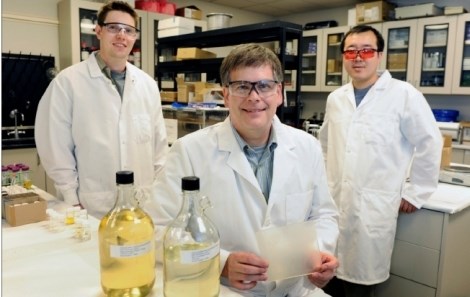NDSU researchers develop coatings from crops
Several agricultural crops could play a significant role in biobased resins and coatings recently developed by researchers at North Dakota State University. Scientists at NDSU have developed biobased resins that may prove to be a “game changer” in coatings and resin technology. The NDSU researchers have developed a family of resins from renewable raw materials, creating resins that eliminate hazardous components such as formaldehyde and bisphenol-A. The resins are based on sucrose and vegetable oils, and can be varied to perform in many applications and industries.

Dr. Dean Webster, North Dakota State University, Fargo, (center) and graduate students T.J. Nelson and Xiao Pan are among a research group that developed a family of resins from renewable raw materials. Photo credit: Dan Koeck, NDSU
Several agricultural crops could play a significant role in biobased resins and coatings recently developed by researchers at North Dakota State University. Scientists at NDSU have developed biobased resins that may prove to be a “game changer” in coatings and resin technology.
The NDSU researchers have developed a family of resins from renewable raw materials, creating resins that eliminate hazardous components such as formaldehyde and bisphenol-A. The resins are based on sucrose and vegetable oils, and can be varied to perform in many applications and industries, according to Dean Webster, professor in the NDSU Department of Coatings and Polymeric Materials. Webster’s research group includes NDSU graduate students Xiao Pan and T. J. Nelson, undergraduate student Adlina Paramarta and Partha Sengupta, former postdoctoral researcher at NDSU.
The resins developed by the NDSU research group can be made from from sugarbeets, plus oils from soybeans, flax and sunflowers. When cured, the patent-pending resins show:
-Significantly improved properties over current biobased materials and processes
-Mechanical properties comparable to petrochemical-based materials
-Dramatically increased renewable material content
“These NDSU-developed technologies achieve what few biobased materials have before,” said Webster. “They have vastly improved mechanical properties, reduced hazardous chemical content and are made from readily available materials and common processes. The technologies have the potential for significantly impacting biobased material markets.” The biorenewable chemicals market is projected to reach $5 billion by 2015.
Related Content
-
Henry Ford Is Still Right When It Comes to Color
Who would have imagined that more than 100 years after his famous statement about any color as long as it’s black would still have relevance of a sort?
-
Masking Solutions Provider CFS Dramatically Expands Capabilities and Capacity
Custom Fabrication & Supplies (CFS) completed a new plant expansion packing 10 times the capacity into twice the space. It dramatically enhances the supplier’s custom capabilities to provide extremely precise and cost-effective masking solutions.
-
Intumescent Coating Provides Up to 3 Hours of Fire Protection
PPG Steelguard 951 coating is designed to provide protection against fire and corrosion.













.jpg;maxWidth=300;quality=90)

